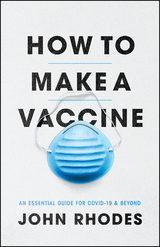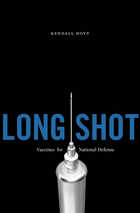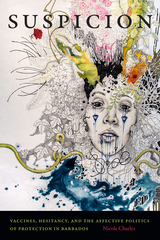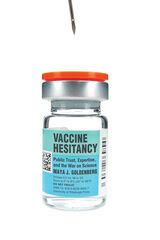
As the COVID-19 pandemic has affected every corner of the world, changing our relationship to our communities, to our jobs, and to each other, the most pressing question has been—when will it end? Researchers around the globe are urgently trying to answer this question by racing to test and distribute a vaccine that could end the greatest public health threat of our time. In How to Make a Vaccine, an expert who has firsthand experience developing vaccines tells an optimistic story of how three hundred years of vaccine discovery and a century and a half of immunology research have come together at this powerful moment—and will lead to multiple COVID-19 vaccines.
Dr. John Rhodes draws on his experience as an immunologist, including working alongside a young Anthony Fauci, to unravel the mystery of how vaccines are designed, tested, and produced at scale for global deployment. Concise and accessible, this book describes in everyday language how the immune system evolved to combat infection, how viruses responded by evolving ways to evade our defenses, and how vaccines do their work. That history, and the pace of current research developments, make Rhodes hopeful that multiple vaccines will protect us. Today the complex workings of the immune system are well understood. The tools needed by biomedical scientists stand ready to be used, and more than 160 vaccine candidates have already been produced. But defeating COVID-19 won’t be the end of the story: Rhodes describes how discoveries today are also empowering scientists to combat future threats to global health, including a recent breakthrough in the development of genetic vaccines, which have never before been used in humans.
As the world prepares for a vaccine, Rhodes offers a current and informative look at the science and strategies that deliver solutions to the crisis.

At the turn of the twenty-first century, the United States contended with a state-run biological warfare program, bioterrorism, and a pandemic. Together, these threats spurred large-scale government demand for new vaccines, but few have materialized. A new anthrax vaccine has been a priority since the first Gulf War, but twenty years and a billion dollars later, the United States still does not have one. This failure is startling.
Historically, the United States has excelled at responding to national health emergencies. World War II era programs developed ten new or improved vaccines, often in time to meet the objectives of particular military missions. Probing the history of vaccine development for factors that foster timely innovation, Kendall Hoyt discovered that vaccine innovation has been falling, not rising, since World War II. This finding is at odds with prevailing theories of market-based innovation and suggests that a collection of nonmarket factors drove mid-century innovation. Ironically, many late-twentieth-century developments that have been celebrated as a boon for innovation—the birth of a biotechnology industry and the rise of specialization and outsourcing—undercut the collaborative networks and research practices that drove successful vaccine projects in the past.
Hoyt’s timely investigation teaches important lessons for our efforts to rebuild twenty-first-century biodefense capabilities, especially when the financial payback for a particular vaccine is low, but the social returns are high.

Duke University Press Scholars of Color First Book Award recipient

The public has voiced concern over the adverse effects of vaccines from the moment Dr. Edward Jenner introduced the first smallpox vaccine in 1796. The controversy over childhood immunization intensified in 1998, when Dr. Andrew Wakefield linked the MMR vaccine to autism. Although Wakefield’s findings were later discredited and retracted, and medical and scientific evidence suggests routine immunizations have significantly reduced life-threatening conditions like measles, whooping cough, and polio, vaccine refusal and vaccine-preventable outbreaks are on the rise. This book explores vaccine hesitancy and refusal among parents in the industrialized North. Although biomedical, public health, and popular science literature has focused on a scientifically ignorant public, the real problem, Maya J. Goldenberg argues, lies not in misunderstanding, but in mistrust. Public confidence in scientific institutions and government bodies has been shaken by fraud, research scandals, and misconduct. Her book reveals how vaccine studies sponsored by the pharmaceutical industry, compelling rhetorics from the anti-vaccine movement, and the spread of populist knowledge on social media have all contributed to a public mistrust of the scientific consensus. Importantly, it also emphasizes how historical and current discrimination in health care against marginalized communities continues to shape public perception of institutional trustworthiness. Goldenberg ultimately reframes vaccine hesitancy as a crisis of public trust rather than a war on science, arguing that having good scientific support of vaccine efficacy and safety is not enough. In a fraught communications landscape, Vaccine Hesitancy advocates for trust-building measures that focus on relationships, transparency, and justice.
READERS
Browse our collection.
PUBLISHERS
See BiblioVault's publisher services.
STUDENT SERVICES
Files for college accessibility offices.
UChicago Accessibility Resources
home | accessibility | search | about | contact us
BiblioVault ® 2001 - 2024
The University of Chicago Press









